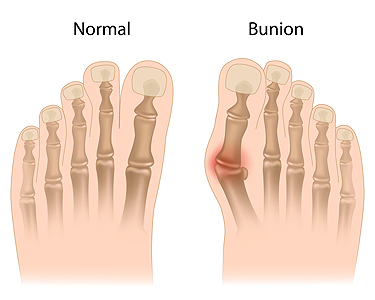 Bunion pain arises when a bony bump forms on the joint at the base of the big toe. This condition, known as a bunion, occurs due to prolonged pressure on the foot, often from wearing tight or ill-fitting shoes. The pressure causes the big toe to lean towards the second toe, resulting in the joint jutting out and becoming inflamed. This inflammation leads to pain, swelling, and redness. Genetics also plays a role, as bunions can run in families. Additionally, certain foot shapes and conditions, such as flat feet or arthritis, increase the likelihood of developing bunions. The pain can be worsened by activities that put extra stress on the feet, such as standing for long periods or engaging in high-impact sports. Proper footwear, orthotics, and, in severe cases, surgery can help alleviate bunion pain. If you have a bunion that is causing you pain and discomfort, it is suggested that you confer with a podiatrist who can determine the best course of treatment for you.
Bunion pain arises when a bony bump forms on the joint at the base of the big toe. This condition, known as a bunion, occurs due to prolonged pressure on the foot, often from wearing tight or ill-fitting shoes. The pressure causes the big toe to lean towards the second toe, resulting in the joint jutting out and becoming inflamed. This inflammation leads to pain, swelling, and redness. Genetics also plays a role, as bunions can run in families. Additionally, certain foot shapes and conditions, such as flat feet or arthritis, increase the likelihood of developing bunions. The pain can be worsened by activities that put extra stress on the feet, such as standing for long periods or engaging in high-impact sports. Proper footwear, orthotics, and, in severe cases, surgery can help alleviate bunion pain. If you have a bunion that is causing you pain and discomfort, it is suggested that you confer with a podiatrist who can determine the best course of treatment for you.
If you are suffering from bunion pain, contact one of our podiatrists of Bangor Podiatry. Our doctors can provide the care you need to keep you pain-free and on your feet.
What Is a Bunion?
Bunions are painful bony bumps that usually develop on the inside of the foot at the joint of the big toe. As the deformity increases over time, it may become painful to walk and wear shoes. Women are more likely to exacerbate existing bunions since they often wear tight, narrow shoes that shift their toes together. Bunion pain can be relieved by wearing wider shoes with enough room for the toes.
Causes
- Genetics – some people inherit feet that are more prone to bunion development
- Inflammatory Conditions - rheumatoid arthritis and polio may cause bunion development
Symptoms
- Redness and inflammation
- Pain and tenderness
- Callus or corns on the bump
- Restricted motion in the big toe
In order to diagnose your bunion, your podiatrist may ask about your medical history, symptoms, and general health. Your doctor might also order an x-ray to take a closer look at your feet. Nonsurgical treatment options include orthotics, padding, icing, changes in footwear, and medication. If nonsurgical treatments don’t alleviate your bunion pain, surgery may be necessary.
If you have any questions, please feel free to contact our offices located in Bangor, Gilbert, and Bethlehem, PA . We offer the newest diagnostic and treatment technologies for all your foot care needs.
